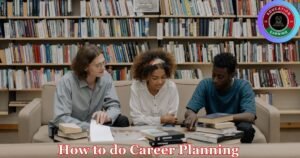Education and Career Planning for Students – Importance

Education and career planning are essential for students to ensure they make the most of their academic journey and achieve success in their chosen fields. This blog post will provide insights and guidance on how students can effectively plan their education and career paths.
Importance of Career Planning –
Career planning helps students:
- Explore and synthesize career-related information.
- Set clear career goals.
- Make informed career-related decisions and take actions.
- Reach their career goals and maintain a general work-life balance

Career Planning in High School
Starting career planning as early as secondary education can provide clarity about students’ career paths and help them achieve job safety and financial stability later on
Some steps to follow include:
- Identifying interests, strengths, and weaknesses.
- Researching various career options.
- Discussing career aspirations with mentors or career counselors.
- Participating in internships, job shadowing, or volunteer work related to the chosen field.
- Developing an Individual Development Plan (IDP) to assess current skills, identify areas for growth, and set short-term and long-term goals
Career Planning in College
During college, students can further refine their career plans by:
- Engaging with faculty members who can provide guidance and support.
- Participating in extracurricular activities, such as clubs, organizations, or research projects, to develop relevant skills and network with professionals in the field.
- Attending career fairs, workshops, and seminars to learn about job opportunities and industry trends.
- Developing a professional development plan to track progress and make adjustments as needed
Alternative Academic Careers
In addition to traditional academic careers, students can explore alternative options, such as:
- Industry, government, or nonprofit positions.
- Freelance or remote work opportunities.
- Alternative academic careers, such as research, consulting, or non-tenure track positions
FAQs (Frequently Asked Questions)

Q: How can I choose the right career path?
A: To choose the right career path, consider your interests, strengths, and values. Reflect on your passions, skills, and experiences to identify potential career options. Research different fields and industries to understand the job market and salary expectations. Seek advice from mentors, career counselors, and faculty members to gain insights and guidance.
Q: How can I gain practical experience in my chosen field?
A: To gain practical experience, consider internships, job shadowing, volunteer work, or participating in specialized courses or project work. These experiences can help you develop relevant skills, build a professional network, and confirm your career interests.
Q: How can I create a successful Individual Development Plan (IDP)?
A: To create a successful IDP, assess your current skills and strengths, identify areas for growth, and set short-term and long-term goals. Include relevant experiences, such as internships, certifications, or courses, and track your progress regularly. Update your IDP as needed to ensure you stay on track towards your career goals.
Q: How can I manage my time effectively between studies and career planning?
A: To manage your time effectively, prioritize tasks, set realistic goals, and create a schedule. Allocate dedicated time for studying, career planning, and extracurricular activities. Use time management tools, such as calendars, to-do lists, and reminders, to stay organized and on track.
Q: How can I network with professionals in my chosen field?
A: To network with professionals, attend industry events, conferences, and workshops. Join professional organizations, social media groups, and online forums to connect with peers and mentors. Engage in conversations, ask questions, and offer your insights to build relationships and learn from others in your field.
At the End
Education and career planning are crucial for students to make the most of their academic journey and achieve success in their chosen fields. By following these steps and seeking guidance from mentors and career counselors, students can effectively plan their education and career paths, ultimately leading to a fulfilling and successful career.



Pingback: How to Stay Calm and Perform Well During Board Exams
Pingback: Shoaib Malik: Personal Life and Relationships in Hindi - Life Coach